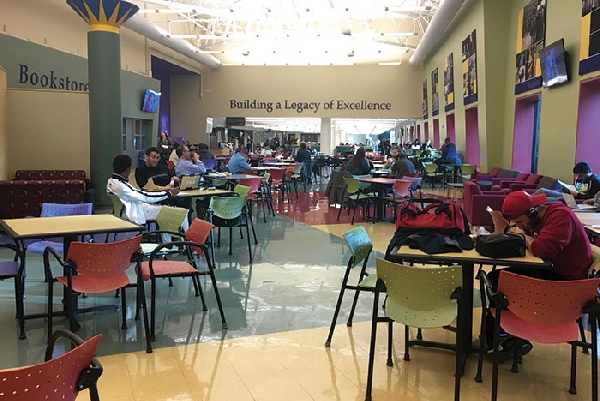
DEARBORN — Human nature has a way of dividing people. Differences in skin color, beliefs, cultural backgrounds and pure selfishness can all contribute to dissension, but despite the passionate hate crimes the mainstream media often reports, not everyone has an agenda of harm.
The rise of terrorist groups like ISIS and Boko Haram has caused fear among many Arabs and non-Arabs alike in recent years, which sometimes colors the way people view the Arab community at large. However, students who are part of the diverse population at the University of Michigan-Dearborn are continually reminded that individuals cannot be stereotyped into everything the mass media portrays.
Diane Awa, a 24-year-old senior from Cameroon, came to the United States in 2014 for schooling. Awa said the media sometimes paints a fearful picture of Arabs, which has the power to evoke fear in individuals, but getting to know people personally makes a huge difference.
“When I got to meet with [Arabs] one on one, then I got to understand them personally,” Awa said. “I was kind of fearful of them, but now I am not. They are friendly and kind and prayerful – they like to help each other.”
Awa acknowledged that while terrorism is a serious and very real threat that stirs up fear and hostility, particularly with the various acts of terror that have taken place overseas, she wishes the media would also report the good things that are happening.

“The media does not really put out the good things about the Arabs,” she said. “They just focus on the bad things they do, and that’s just not right. I believe the media should discuss it both ways – the bad and the good – and not only focus on one side.”
Grace Moore, a 21-year-old senior from Southgate, said the media also make it seem like there is more of a conflict locally than there actually is. She noted her acceptance by the community, even though she doesn’t share the same culture or religion.
“I didn’t necessarily think that as a White, Christian woman, it would be inclusive to me,” she said. “I have found numerous Arab American friends who are very kind to me. They know I’m a Christian, but that doesn’t keep them from being my friend.”
Likewise, Ghadir Haidar, an 18-year-old freshman who lives in Dearborn with her Lebanese family, was surprised at how much cultural diversity U of M-Dearborn has after graduating from Star International Academy, a charter school in Dearborn Heights with a predominantly Arab student population.
“I took dual-enrollment classes at Henry Ford and it was all Arabs,” she said. “But when I came here, it was a whole different perspective. There are so many different cultures and races here.”
Haidar also said U of M-Dearborn fosters an environment of acceptance, which reminds people we are all equal.
“I feel like everyone is accepted here,” she said. “There is no racism or differences between others. We’re all human, so there’s nothing different between us and what we believe in and what we do.”
She pointed out that terrorism is not a part of Islam and suggested that perhaps there would be a better understanding between cultures if the media also showed that the Muslim community has the completely opposite principles of terrorist groups.
“The terrorist attacks don’t represent all Muslims,” Haidar said. “That’s not what we believe in. We believe in peace and love with each other. We’re not trying to hurt anyone. Our goal is to get along with each other and be good with each other; and that’s all that really matters in Islam.”
Rabab Qamar, whose family is from Saudi Arabia, is a third year student who plans on graduating in April.
She also noted the university’s diverse and inclusive atmosphere. Many of the clubs on campus have diverse members, she said, and there is not a stereotypical division between any of the different ethnic groups.
“Here it’s very inclusive,” Qamar said. “It’s clear that [the different groups] are working together.”
Rachel Willis, a 24-year-old senior from Novi, had little experience with the Arab culture before coming to U of M-Dearborn, and she didn’t have many expectations of what the culture might be like. However, what she’s learned has been a pleasant surprise.
“Everyone in the Arabic community has been really nice, honestly,” she said. “They’ve all been really helpful and polite.”
Ali Hachem, a 19-year-old sophomore whose family is from Lebanon, said that no matter what race someone is, the important thing is to enjoy college and not let prejudiced people hold an individual back from achieving whatever he or she wants.
“The people that are holding people back and looking out for their own self-interests and nothing else, you have to block those people out,” he said, adding that overcoming differences and prejudices is what helps make the world a better place.






Leave a Reply